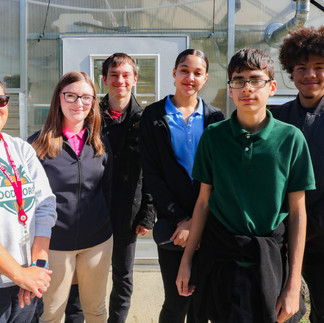Experiential Learning Projects Help Students Earn Spots in Governor’s Honors Program
- EricJones

- Nov 29, 2023
- 1 min read

Students from Dr. Hall-Stanford's second block science class at Baldwin High School embarked on a trip to weigh fish at the school's outdoor aquaponics lab, a crucial step in determining the appropriate amount of food for these aquatic residents. It's experiential projects like these that earned BHS Sophomore Q'Mari Wilcher and classmate Zariya Stanton a place in Governor Kemp's Honor Program for Environmental Science, which will allow them to study at colleges across Georgia to see bigger and fuller laboratories like these.

The focus of the students' recent efforts revolves around ecosystems and, more specifically, a newfound chapter on water conservation. Dunlow emphasizes the significance of incorporating classroom learning into real-world settings: "What we are trying to do is incorporate what they're learning in their science class and incorporating it here in the aquaponics lab as well as in the garden."
This approach serves a dual purpose, enriching the students' understanding of scientific concepts while fostering a sense of responsibility towards environmental conservation. The aquaponics lab, with its interconnected system of fish and plants, becomes a living model for the intricate balance found in ecosystems. For Wilcher, who hopes to become a forensic scientist when he graduates college, these kind of environmental interactions are essential. "Environmental science and physical science elements may let you know how maybe a fire got started or whether water is polluted or not, and things like that," Wilcher said.
Baldwin County School District's integration of classroom teachings with hands-on experiences in the aquaponics lab exemplifies a holistic approach to science education. By immersing students in the practical aspects of their studies, the school fosters a deeper appreciation for environmental sustainability.
















































Comments